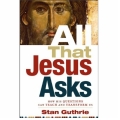Stan Guthrie. All That Jesus Asks: How His Questions Can Teach and Transform Us. Baker Books: 2010. ISBN: 9780801071546.
Stan Guthrie is an author, editor, and literary agent who earned an undergraduate degree in journalism from the University of Florida and a graduate degree in missions from Columbia International University. He has written two books: Missions in the Third Millennium: 21 Key Trends for the 21st Century (2001) and All That Jesus Asks: How His Questions Can Teach and Transform Us (2010). Since 1999, Guthrie has been employed by Christianity Today in a variety of editorial positions. He recently launched a new professional website, which features his new blog. Interested parties can read even more on his old blog.
Book Basics
All That Jesus Asks explores the 295 questions Jesus asks as recorded in the first five books of the New Testament (Matthew: 85, Mark: 64, Luke: 91, John: 52, and Acts: 3). Guthrie divides the questions into five sections:
- Who is Jesus?

- How do You Follow Him?
- Where is Your Thinking?
- Why is Character so Vital?
- What are Some Critical Doctrines?
Of all the books I have reviewed since starting this blog, this was the biggest disappointment. Several people I respect have written glowing reviews and I looked forward to an in-depth exploration of Jesus as question asker that would aid in my ongoing journey to both better understand and more fully follow Jesus. Instead, I experienced a 350 page book that read like something written a generation ago directed at a narrow view of modern Evangelical Christians who would readily embrace the title of conservative. The strength of the book, for readers at any stage on the journey of following or at any point on the theological spectrum, is a comprehensive list of questions Jesus asked. I appreciate Guthrie’s 15 page “Question Index” and will use it as a guide for further study.
So What?
Jesus was an incredibly gifted teacher who understood the value of asking questions of his disciples rather than simply providing them with information. How have you learned to incorporate this practice in your ministry? Do you find that you tend to give your listeners more information to process or more questions to ponder? Which tends to have the greatest long term impact? Why?
Those who are regular readers of my blog know that I seek to gather information, but rather than connecting all of the dots for you (something no one can do nor should seek to aspire to do) I raise questions that I hope will enable you to struggle with the material so that you can begin to make the connections in ways that are meaningful in your context.
